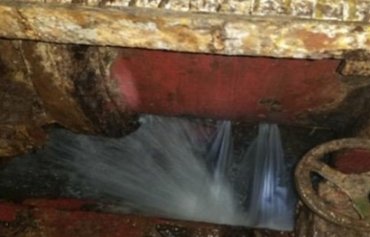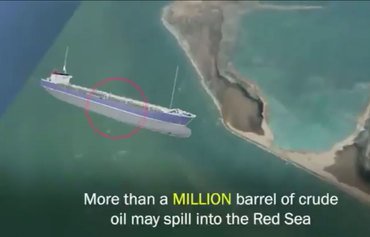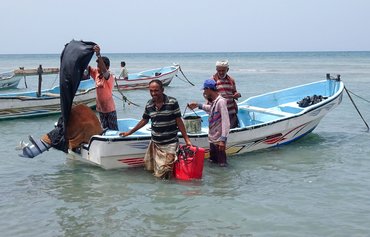When an alarm sounded on the decaying oil tanker off Yemen's coast, signalling a leak in its engine room, engineer Hussein Nasser quickly sprang into action.
Working around the clock for days, he and the half dozen others on board the FSO Safer fashioned makeshift iron strips to patch a burst pipe, before divers arrived to install a permanent steel plate to keep seawater from sinking the ship.
The incident in 2020 was just one example of how a crew of no more than seven or eight sailors and engineers have laboured for years to keep afloat the FSO Safer tanker abandoned off Yemen and to stave off an environmental calamity.
The sinking of the vessel, or an on-board explosion, would have unleashed a thin slick of oil across the Red Sea, imperiling wildlife, coastal fishing villages, lifeline ports and maritime traffic.
![The deck of the UN-owned Nautica vessel, moored off the coast of Yemen's al-Hodeidah province, is seen here on July 17. [Mohammed Huwais/AFP]](/cnmi_am/images/2023/07/21/43098-UN-owned-Nautica-600_384.jpg)
The deck of the UN-owned Nautica vessel, moored off the coast of Yemen's al-Hodeidah province, is seen here on July 17. [Mohammed Huwais/AFP]
![Visitors arrive on a pilot boat at the UN-owned Nautica vessel on July 17. [Mohammed Huwais/AFP]](/cnmi_am/images/2023/07/21/43099-Nautica-pilot-boat-600_384.jpg)
Visitors arrive on a pilot boat at the UN-owned Nautica vessel on July 17. [Mohammed Huwais/AFP]
![Birds stand on the keel of the beleaguered Yemen-flagged FSO Safer oil tanker in the Red Sea off the coast of al-Hodeidah on July 15. [Mohammed Huwais/AFP]](/cnmi_am/images/2023/07/21/43101-Birds-Safer-hull-600_384.jpg)
Birds stand on the keel of the beleaguered Yemen-flagged FSO Safer oil tanker in the Red Sea off the coast of al-Hodeidah on July 15. [Mohammed Huwais/AFP]
With the arrival on July 16 of a tanker, the Nautica, owned by the United Nations (UN), anxiety about the 47-year-old Safer –- which has been woefully neglected during Yemen's ongoing war -- is about to ease.
But that depends on the successful transfer of its oil to the Nautica.
Handover ceremony
The Nautica sailed from Djibouti on July 15, arriving in Yemeni waters before midday the next day, when a handover ceremony took place aboard the tanker in the presence of the Iran-backed Houthi authorities.
The UN had been hoping for a low-key event, but the Houthis invited high-ranking officials as well as more than 20 local journalists to board the new ship.
As Houthi officials looked on, UN resident co-ordinator for Yemen David Gressly signed the handover papers along with Edrees al-Shami, the Houthi-appointed executive general manager of SEPOC, the Yemeni oil and gas company.
Gressly said the ship transfer had been organised with the participation of all parties to Yemen's conflict and that the tanker -- which is being renamed the Yemen -- now belonged to "the people of Yemen".
But Houthi officials have said it will fall under their control.
"The handover is to the Safer company (SEPOC), which is located in Sanaa. So Safer in Sanaa is authorised to receive the tanker," Houthi official Abdulwahab al-Dhura told AFP.
The internationally recognised government in Aden does not acknowledge al-Shami's authority and has named its own executive general manager of SEPOC.
Despite the ongoing wrangling, the arrival is a rare bright spot after more than eight years of fighting between the Houthis, who control the waters where the Safer is moored, and Yemen's government.
Constant anxiety
For members of the Safer's skeleton crew, the milestone is a time to reflect on their long stints at sea with little food, no air conditioning and near-constant stress.
"Anxiety accompanies us all the time as a result of the worn-down condition of the ship," said Nasser, who works for the Houthis' maritime affairs authority.
The Houthis praise men like Nasser as the "unsung heroes" of the Safer saga.
Yet the Houthis have long been accused of courting disaster by using the Safer as a bargaining chip, blocking UN inspection requests and demanding that oil revenue be used to pay the salaries of their employees.
After more than eight years without maintenance, there is no disputing the ship is in awful condition, with rust and fast-spreading fungus streaking its red-and-grey hull, whose thickness has worn away by 4mm in places.
"Any oil ship needs regular maintenance... to keep the ship safe," said Ebrahim al-Moshki, director of al-Hodeidah's maritime affairs authority.
"But the staff here are sometimes just three or five, while they used to be 72" before the war.
Fixing leaks below deck was especially fraught given the intense heat and vapours coming off the crude, which can raise the possibility of igniting a blast from something as small as the flick of a cigarette.
Averting catastrophe
On Sunday, Nasser visited al-Hodeidah's main fish market, which would almost certainly have been shut down in the event of an oil spill.
A major spill could result in ecological disaster, devastate Yemeni fishing communities and close lifeline ports and desalination plants.
The potential spill -- which could cost more than $20 billion to clean up -- could reach Saudi Arabia, Eritrea, Djibouti and Somalia, the UN has warned.
The UN has said that the area's fishing industry has a half-million employees, and that 200,000 livelihoods "would be instantly wiped out".
"All of them would be affected badly," said Nasser, gesturing to the fishermen trying to unload wheelbarrows full of barracuda, parrotfish and even sharks at auction.
The delicate operation to transfer 1.14 million barrels of Marib light crude to the Nautica is expected to begin next week. Assuming the transfer operation is a success, the oil will stay on the Nautica for the foreseeable future.
Ownership of the oil is disputed by Yemen's warring factions.
The Houthis have previously said they want to sell it and use the revenue to cover their employees' salaries. They also have called for the completion of onshore storage facilities where the crude could potentially go.
Lingering concerns
Despite stringent safety checks, concerns remain about a spill or an explosion.
"The risk is very high," said the UN Development Programme (UNDP) project manager for the Safer, Mohammed Mudawi. "But we are hoping with the completion of the project that this will be eliminated."
Mudawi said lingering concerns about the Safer's infrastructure require oil pumping to start during the day, at least 10 hours before sunset, to ensure all connections are secure and that workers can monitor for leaks.
Maintenance operations on the Safer were suspended in 2015 because of Yemen's war, and the UNDP has for years warned it could "explode at any time".
Scorching summer temperatures, aging pipes and sea mines lurking in surrounding waters all pose threats to the operation, which has been under preparation since late May by specialists from the private company SMIT Salvage.
The team has inspected the vessel, arranged transfer pumps and hoses and pumped inert gas into cargo tanks to lower the risk of an explosion, Gressly told the UN Security Council on Monday.
Working at the height of summer, when on-deck temperatures soar above 50 degrees Celsius, is an additional hazard, said Nick Quinn, a senior adviser for the project.
"It becomes really hot, really quickly," Quinn said, noting that this increases the odds of "slips, trips and falls" on deck for workers donning heavy personal protective equipment.
Ongoing saga
Once the transfer of oil is under way, UN officials expect it to take about three weeks.
The saga will not end there, however, because the question of who owns the oil will still need to be resolved by the warring Yemeni factions.
The Nautica will stay in the area as ownership talks continue.
"Once we transfer the oil, we would have to then take care of the new vessel," said al-Shami, the Houthi-appointed executive general manager of SEPOC.
"So we move the problem from an older, aging vessel to a newer vessel," al-Shami said. "But the sea conditions are very rough, and if you don't maintain it for a while, then you go back to the same problem."

![The Yemen-flagged FSO Safer oil tanker, seen here on July 15, is anchored in the Red Sea off Yemen's al-Hodeidah province. [Mohammed Huwais/AFP]](/cnmi_am/images/2023/07/21/43097-Yemen-Safer-tanker-600_384.jpg)






